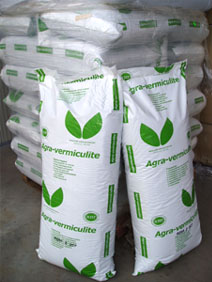Vermiculite 100 l 0-2 mm
What is vermiculite?
Vermiculite is a compacted silicate material with grains that resemble tiny stone-like flakes. It is produced by heating vermiculite to 870°C. The resulting fine grains have a spongy consistency and excellent absorbency. When applied to the soil, vermiculite reacts with potassium, calcium and magnesium and can increase the pH of plants, despite its own pH of 7,0. When water is present, the vermiculite granules absorb it and swell up due to their spongy structure.
What can vermiculite be used for in the garden?
It can be used to improve the water retention capacity of the growing medium. Vermiculite can absorb up to 3-4 times its volume. Vermiculite does not break down in the soil like manure or compost. This means that it absorbs and retains water every time it is watered or rained on, until the soil starts to dry out. But it is important to remember that it is not a renewable material!
Among other things, vermiculite can be added to the soil of plant containers, garden soil or compost to improve their water retention capacity. It is also an ideal addition to composting soil. Due to its granular, spongy nature, vermiculite reduces soil density, which can also be useful in some cases.
When combined with compost or peat moss, it can stimulate root growth, improving root stability of younger seedlings. It can also be used on the surface as a mulch, especially for seed germination.
| Weight: | 10.01 kg |
|---|---|
| Width: | 500 mm |
| Height: | 1100 mm |
| Length: | 220 mm |
| Aviability: | 1-4 nap |
| Basic sales unit: | db |
| Culture: | Díszkert, Dísznövény |
| Biztonságtecnikai Adatlap | T02721-1-Attachment-InternetGazda-MSDSAgra-vermiculite-English.pdf |
|---|---|
| Termék ismertető | T02721-2-Attachment-InternetGazda-ChemischeanalyseAgra-vermiculite2012.pdf |
Login
Login
